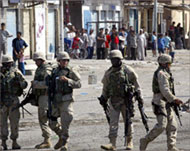Iraq invasion ‘a public health disaster’
Last year’s US-led invasion of Iraq has caused a dramatic deterioration in the health of the Iraqi people, according to a new report.

Medact, a UK-based medical charity, said on Tuesday that the ongoing conflict had led – directly and indirectly – to many thousands of deaths and injuries, and high levels of illness.
The charity blames Iraq’s predicament on conflict, criminality, social inequality, lack of democracy, political instability, the presence of foreign forces and decrepit essential infrastructure.
It says there has been an alarming recurrence of previously well-controlled communicable diseases including diarrhoea, acute respiratory infections and typhoid, particularly among children.
There is also a greater burden of non-communicable disease, but a lack of resources, facilities and expertise to reverse the trend.
The likely consequence, says Medact, will be further preventable death and disability.
“The 2003 war exacerbated the threats to health posed by the damage inflicted by previous wars, tyranny and [US-sponsored UN] sanctions. It not only created the conditions for further health decline, but also damaged the ability of Iraqi society to reverse it,” the report said.
Health relief ‘mismanaged’
Behavioural problems such as family violence, child and spouse abuse and acts of public violence greatly increase in conflict and post-conflict situations, says Medact.
And the effects of the psychosocial trauma suffered by the Iraqi people create preconditions for further violence.
Medact director Mike Rowson said Iraqis increasingly rely on self-diagnosis and traditional healing, and buy prescription medicines in the marketplace.
|
“The 2003 war exacerbated the threats to health posed by the damage inflicted by previous wars, tyranny and sanctions. It not only created the conditions for further health decline, but also damaged the ability of Iraqi society to reverse it” Medact report |
Under-the-table payments are required to secure many services, and there is widespread suspicion of criminal involvement in the distribution of pharmaceutical supplies.
The UN, traditionally responsible for coordinating humanitarian crisis responses, has been marginalised, said Rowson, while US assistance has been characterised by damaging political in-fighting.
Moreover, aid and development workers run great risks and most humanitarian agencies have left central and southern Iraq, which remains largely a war zone.
“Health relief and reconstruction efforts have been mismanaged so far,” said Rowson.
Independent health commission
“The UK government could play a bigger role in supporting the Iraqi authorities to provide emergency relief and build a better health system.
“Decisive action is needed to halt this health disaster -immediate help for civilians whose health is at risk, urgent assessment of their health needs, and the establishment of an independent inquiry into the state of the population’s health.”
 |
|
The report says foreign forces |
The charity says that the US and UK authorities continue to deny the true extent of harm to the Iraqi population.
It recommends that an independent commission should make a thorough investigation of casualties and the state of health in Iraq.
Foreign forces should also monitor casualties, re-evaluate the impact of weaponry in populated areas, comply with the Geneva Conventions, and ensure health services are accessible to civilians in conflict areas.
The report follows a recent scientific study which said that more than 100,000 Iraqis might have died since the 2003 invasion – mostly from violence, mainly air strikes.
Most of those reportedly killed by foreign forces were women and children, according to the British medical journal The Lancet.
Parlous health system
Many thousands of conflict-related injuries were also sustained.
However, The United States Agency for International Development (USAid), which oversees Iraqi redevelopment, says it has revived Iraq’s run-down health system since the invasion.
|
“Decisive action is needed to halt this health disaster” Mike Rowson, |
It says it has done this by refurbishing health clinics, repairing sewerage systems, and through vaccination campaigns and delivering medicines.
Health spending has reached 60 times pre-war levels, according to USAid.
The organisation blames the parlous state of Iraq’s health system on neglect and mismanagement during the Saddam years.